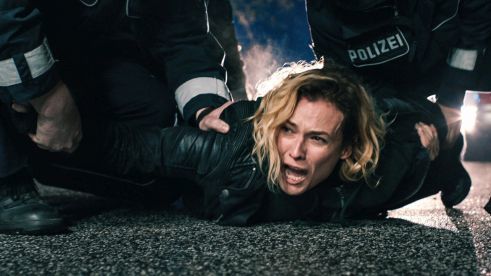Film review
In the Fade: History’s influence cuts both ways

It has taken Diane Kruger nearly two decades to star in a German-language film; however ‘In the Fade’ was worth the wait. Gracing the screen in writer/director Fatih Akin’s exploration of terror, grief and vengeance, she turns in one of the finest performances of her career — conveying pain and sorrow in her first starring role in her native tongue, and winning this year’s Cannes Film Festival best actress award for her efforts.
The lack of previous German productions on Kruger’s resume may be a historical detail, but it’s fitting that it looms over In the Fade, a drama that derives its tension from the past. Here, history can't be forgotten: not in a country that refuses to overlook its previous troubles, and not for a woman left suffering after a racially motivated, hate-fuelled tragedy. Entering the film with a grin but soon brandishing only a grimace, Kruger’s Katia is haunted by tragedy. It takes years for her to evolve from a jailhouse bride marrying incarcerated Kurdish drug dealer Nuri Şekerci (Numan Acar), to a content wife and mother with a six-year-old son (Rafael Santana). It takes moments for her modest idyll to get blown apart.
An idyll blown up
Thanks to a discarded bike packed with nails and explosives, and then wielded as a tool of violent intolerance, she’s swiftly pushed into the film’s titular netherworld — though emotionally and metaphorically, often while finding solace in drugs and alcohol, rather than literally like her loved ones. And so, with both the delicacy and force heard in Josh Homme’s accompanying score, In the Fade asks: what comes next? How does a woman keenly cognisant of the life she’s now missing find a way to cope in the face of both physical and ideological destruction and devastation? Award winning actress Diane Kruger conveys pain and sorrow in her first starring role in her native tongue
| © In the Fade
They’re just some of the trains of thought that Akin’s film inspires as it breaks Katia’s experience into three chapters — titled ‘The Family’, ‘Justice’ and ‘The Sea’ — charting her once happy home, her determined legal fight, and the choices that arise when crusading for one can’t placate her sadness over the other. Rarely allowing Kruger to leave the frame, In the Fade dissects her mourning, as well as her attempt to find a way forward. In shots layered with melancholy by Akin’s regular cinematographer Rainer Klausmann, it hews close as she’s told that her husband and son are now mere body parts, and inches closer still when she’s staring down their accused Neo-Nazi-affiliated murderers in court. In the feature’s final segment, it studies every inch of her face as she contemplates her own resolution.
Award winning actress Diane Kruger conveys pain and sorrow in her first starring role in her native tongue
| © In the Fade
They’re just some of the trains of thought that Akin’s film inspires as it breaks Katia’s experience into three chapters — titled ‘The Family’, ‘Justice’ and ‘The Sea’ — charting her once happy home, her determined legal fight, and the choices that arise when crusading for one can’t placate her sadness over the other. Rarely allowing Kruger to leave the frame, In the Fade dissects her mourning, as well as her attempt to find a way forward. In shots layered with melancholy by Akin’s regular cinematographer Rainer Klausmann, it hews close as she’s told that her husband and son are now mere body parts, and inches closer still when she’s staring down their accused Neo-Nazi-affiliated murderers in court. In the feature’s final segment, it studies every inch of her face as she contemplates her own resolution.
A raw expression of processing loss
Grief is an emotion splashed across the screen with frequency; death proves an oft-used dramatic device, an easy shortcut to upend a character’s life, and a continual source of cinematic obsession, as though committing it to celluloid can help demystify humanity’s relationship with mortality. Indeed, Akin is no stranger to exploring its impact, as his filmography — his Berlinale Golden Bear-winning Head On, the contemplative The Edge of Heaven, and Armenian genocide drama The Cut included — demonstrates. Fatih Akin’s 'In the Fade' steps into topical territory and reflecting real-life tensions
| © In the Fade
And yet, the power of Kruger’s performance stems from its ability to almost erase that familiarity from the audience’s memory for the film’s 106-minute running time. Offering a raw and intimate expression of processing loss, her portrayal lays bare Katia’s fragile state as though nothing else in the world matters. A flash of realisation piercing her eyes, a flicker of anger as public attacks cut deep, the internal turmoil that weighs down her posture while agonising over a decision: each resounds with specificity and immediacy. They’re gestures that build a character, as well as moments that help audiences see a personal plight amidst a sea of universal themes.
Fatih Akin’s 'In the Fade' steps into topical territory and reflecting real-life tensions
| © In the Fade
And yet, the power of Kruger’s performance stems from its ability to almost erase that familiarity from the audience’s memory for the film’s 106-minute running time. Offering a raw and intimate expression of processing loss, her portrayal lays bare Katia’s fragile state as though nothing else in the world matters. A flash of realisation piercing her eyes, a flicker of anger as public attacks cut deep, the internal turmoil that weighs down her posture while agonising over a decision: each resounds with specificity and immediacy. They’re gestures that build a character, as well as moments that help audiences see a personal plight amidst a sea of universal themes.Still, the latter remain inescapable, simmering beneath the surface as the feature crawls towards its finale. With the Turkish-German filmmaker as experienced at depicting culture clashes as he is at probing mourning, In the Fade steps into topical territory, reflecting real-life tensions and events in Europe tied to the rise of the far-right. Accordingly, in a screenplay written with his Goodbye Berlin co-scribe Hark Bohm, Akin examines a maelstrom of conflict, including in the path he plots for Katia. In the first two sections, viewers feel for her pain, imbued as it is with echoes from the past. In the concluding chapter, they’re forced to interrogate their initial reactions, and confront common perceptions about victims and perpetrators. The empathy directed towards her struggle is hard-earned, as is the ire at its source and their prejudiced mindset; however history’s influence ultimately cuts both ways.